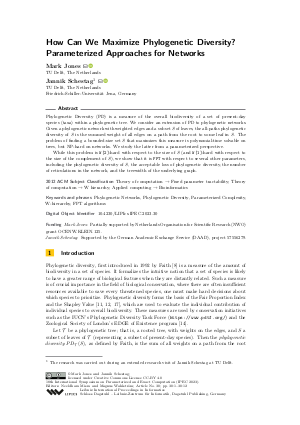How Can We Maximize Phylogenetic Diversity? Parameterized Approaches for Networks
Authors
Mark Jones  ,
Jannik Schestag
,
Jannik Schestag 
-
Part of:
Volume:
18th International Symposium on Parameterized and Exact Computation (IPEC 2023)
Part of: Series: Leibniz International Proceedings in Informatics (LIPIcs)
Part of: Conference: International Symposium on Parameterized and Exact Computation (IPEC) - License:
 Creative Commons Attribution 4.0 International license
Creative Commons Attribution 4.0 International license
- Publication Date: 2023-12-13
File

PDF
LIPIcs.IPEC.2023.30.pdf
- Filesize: 0.74 MB
- 12 pages
Document Identifiers
Subject Classification
ACM Subject Classification
- Theory of computation → Fixed parameter tractability
- Theory of computation → W hierarchy
- Applied computing → Bioinformatics
Keywords
- Phylogenetic Networks
- Phylogenetic Diversity
- Parameterized Complexity
- W-hierarchy
- FPT algorithms
Metrics
- Access Statistics
-
Total Accesses (updated on a weekly basis)
0PDF Downloads0Metadata Views
Abstract
Phylogenetic Diversity (PD) is a measure of the overall biodiversity of a set of present-day species (taxa) within a phylogenetic tree. We consider an extension of PD to phylogenetic networks. Given a phylogenetic network with weighted edges and a subset S of leaves, the all-paths phylogenetic diversity of S is the summed weight of all edges on a path from the root to some leaf in S. The problem of finding a bounded-size set S that maximizes this measure is polynomial-time solvable on trees, but NP-hard on networks. We study the latter from a parameterized perspective. While this problem is W[2]-hard with respect to the size of S (and W[1]-hard with respect to the size of the complement of S), we show that it is FPT with respect to several other parameters, including the phylogenetic diversity of S, the acceptable loss of phylogenetic diversity, the number of reticulations in the network, and the treewidth of the underlying graph.
Cite As Get BibTex
Mark Jones and Jannik Schestag. How Can We Maximize Phylogenetic Diversity? Parameterized Approaches for Networks. In 18th International Symposium on Parameterized and Exact Computation (IPEC 2023). Leibniz International Proceedings in Informatics (LIPIcs), Volume 285, pp. 30:1-30:12, Schloss Dagstuhl – Leibniz-Zentrum für Informatik (2023)
https://doi.org/10.4230/LIPIcs.IPEC.2023.30
BibTex
@InProceedings{jones_et_al:LIPIcs.IPEC.2023.30,
author = {Jones, Mark and Schestag, Jannik},
title = {{How Can We Maximize Phylogenetic Diversity? Parameterized Approaches for Networks}},
booktitle = {18th International Symposium on Parameterized and Exact Computation (IPEC 2023)},
pages = {30:1--30:12},
series = {Leibniz International Proceedings in Informatics (LIPIcs)},
ISBN = {978-3-95977-305-8},
ISSN = {1868-8969},
year = {2023},
volume = {285},
editor = {Misra, Neeldhara and Wahlstr\"{o}m, Magnus},
publisher = {Schloss Dagstuhl -- Leibniz-Zentrum f{\"u}r Informatik},
address = {Dagstuhl, Germany},
URL = {https://drops.dagstuhl.de/entities/document/10.4230/LIPIcs.IPEC.2023.30},
URN = {urn:nbn:de:0030-drops-194496},
doi = {10.4230/LIPIcs.IPEC.2023.30},
annote = {Keywords: Phylogenetic Networks, Phylogenetic Diversity, Parameterized Complexity, W-hierarchy, FPT algorithms}
}
Author Details
Funding
- Jones, Mark: Partially supported by Netherlands Organisation for Scientific Research (NWO) grant OCENW.KLEIN.125.
- Schestag, Jannik: Supported by the German Academic Exchange Service (DAAD), project 57556279.
References
-
Markus Bläser. Computing small Partial Coverings. Information Processing Letters, 85(6):327-331, 2003.

-
Magnus Bordewich, Charles Semple, and Kristina Wicke. On the Complexity of optimising variants of Phylogenetic Diversity on Phylogenetic Networks. Theoretical Computer Science, 917:66-80, 2022.

-
Olga Chernomor, Steffen Klaere, Arndt von Haeseler, and Bui Quang Minh. Split Diversity: Measuring and Optimizing Biodiversity using Phylogenetic Split Networks, pages 173-195. Springer International Publishing, 2016.

-
Marek Cygan, Holger Dell, Daniel Lokshtanov, Dániel Marx, Jesper Nederlof, Yoshio Okamoto, and et al. On Problems as hard as CNF-SAT. ACM Transactions on Algorithms (TALG), 12(3):1-24, 2016.

-
Marek Cygan, Fedor V. Fomin, Lukasz Kowalik, Daniel Lokshtanov, Dániel Marx, Marcin Pilipczuk, Michal Pilipczuk, and Saket Saurabh. Parameterized Algorithms. Springer, 2015.

-
Rodney G. Downey and Michael R. Fellows. Fixed-Parameter tractability and completeness II: On completeness for W[1]. Theoretical Computer Science, 141(1-2):109-131, 1995.

-
Rodney G. Downey and Michael R. Fellows. Fundamentals of Parameterized Complexity. Texts in Computer Science. Springer, 2013.

-
Daniel P. Faith. Conservation evaluation and Phylogenetic Diversity. Biological Conservation, 61(1):1-10, 1992.

-
Michael Fuchs and Emma Yu Jin. Equality of Shapley value and fair proportion index in phylogenetic trees. Journal of mathematical biology, 71:1133-1147, 2015.

-
Frank Gurski, Carolin Rehs, and Jochen Rethmann. Knapsack Problems: A parameterized point of view. Theoretical Computer Science, 775:93-108, 2019.

-
Claus-Jochen Haake, Akemi Kashiwada, and Francis Edward Su. The Shapley value of Phylogenetic Trees. Journal of mathematical biology, 56(4):479-497, 2008.

-
Klaas Hartmann. The equivalence of two Phylogenetic Diodiversity measures: the Shapley value and Fair Proportion index. Journal of Mathematical Biology, 67:1163-1170, 2013.

-
Daniel H. Huson, Regula Rupp, and Celine Scornavacca. Phylogenetic Networks: Concepts, Algorithms and Applications. Cambridge University Press, 2010.

-
Nick J.B. Isaac, Samuel T. Turvey, Ben Collen, Carly Waterman, and Jonathan E.M. Baillie. Mammals on the EDGE: Conservation Priorities Based on Threat and Phylogeny. PLOS ONE, 2(3):1-7, 2007.

-
Bingkai Lin. A simple gap-producing Reduction for the parameterized Set Cover Problem. arXiv preprint arXiv:1902.03702, 2019.

-
Fabio Pardi and Nick Goldman. Species Choice for Comparative Genomics: Being Greedy Works. PLoS Genetics, 1, 2005.

-
David W. Redding and Arne Ø. Mooers. Incorporating evolutionary measures into conservation prioritization. Conservation Biology, 20(6):1670-1678, 2006.

-
Andreas Spillner, Binh T. Nguyen, and Vincent Moulton. Computing Phylogenetic Diversity for Split Systems. IEEE/ACM Transactions on Computational Biology and Bioinformatics, 5(2):235-244, 2008.

-
Mike Steel. Phylogenetic Diversity and the greedy algorithm. Systematic Biology, 54(4):527-529, 2005.

-
H. Martin Weingartner. Capital budgeting of interrelated projects: survey and synthesis. Management Science, 12(7):485-516, 1966.

-
Kristina Wicke and Mareike Fischer. Phylogenetic Diversity and biodiversity indices on Phylogenetic Networks. Mathematical Biosciences, 298:80-90, 2018.

